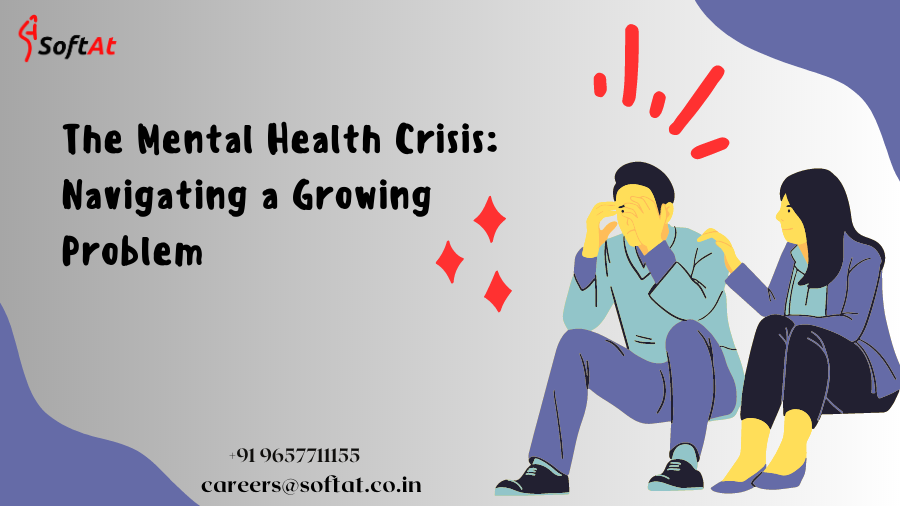Mental health is a crucial aspect of a person’s overall well-being. It refers to a person’s psychological, emotional, and social well-being. Mental health problems can affect anyone at any time, regardless of age, gender, or cultural background. In this blog, we will explore the importance of mental health, common mental health problems, and ways to promote good mental health.
Why is Mental Health Important?
Good mental health is essential for maintaining a positive and productive lifestyle. It can have a significant impact on a person’s physical health, relationships, and overall quality of life. Poor mental health can lead to a range of issues, including:
- Depression and anxiety
- Insomnia or other sleep disorders
- Substance abuse
- Relationship problems
- Low self-esteem
- Suicidal thoughts or behaviors
- Common Mental Health Problems
Mental health problems can take many forms, and each individual’s experience is unique. Some of the most common mental health problems include:
Anxiety Disorders: These are characterized by excessive worry, fear, and nervousness that can interfere with daily activities.
Depression: A mood disorder that affects a person’s thoughts, feelings, and behaviors. Symptoms may include feelings of sadness, hopelessness, and fatigue.
Bipolar Disorder: A condition that causes extreme mood swings, including periods of intense highs (mania) and lows (depression).
Eating Disorders: These are characterized by abnormal eating habits, including overeating or not eating enough. Common eating disorders include anorexia nervosa, bulimia nervosa, and binge-eating disorder.
Substance Abuse Disorders: These are characterized by the compulsive use of drugs or alcohol despite the negative consequences that may result.
Ways to Promote Good Mental Health
There are many ways to promote good mental health and prevent Mental fitness problems. Here are some tips:
Connect with Others: Building strong relationships with family, friends, and community members can provide emotional support and reduce feelings of isolation and loneliness.
Get Regular Exercise: Exercise is a great way to reduce stress, boost mood, and improve overall physical health.
Practice Relaxation Techniques: Mindfulness, meditation, and deep breathing exercises can help reduce stress and promote relaxation.
Maintain a Balanced Diet: A healthy diet that includes plenty of fruits, vegetables, and whole grains can provide the nutrients needed for good mental and physical fitness.
Get Enough Sleep: Adequate sleep is crucial for Mental wellness. Aim for at least 7-8 hours of sleep per night.
Seek Professional Help: If you are experiencing Mental fitness problems, don’t hesitate to seek help from a Mental fitness professional. They can provide a range of treatments, including therapy and medication.
It’s important to remember that Mental wellness problems can affect anyone, regardless of their age, gender, or cultural background. It’s also essential to recognize the signs of Mental wellness problems and seek help if needed. Some common signs of Mental wellness problems include:
- Persistent sadness or feelings of hopelessness
- Excessive worry or fear
- Mood swings or extreme emotions
- Changes in sleeping or eating habits
- Social withdrawal or isolation
- Substance abuse or other self-destructive behaviors
If you or someone you know is experiencing these symptoms, it’s important to seek professional help. Mental health professionals can provide a range of treatments, including therapy and medication, to help manage and treat Mental fitness problems.
In addition to seeking professional help, there are many things you can do to support your mental wellness. Engaging in self-care practices like exercise, mindfulness, and maintaining a healthy diet can help reduce stress and promote relaxation. Building strong relationships with loved ones and seeking social support can also be beneficial.
Finally, it’s important to recognize that Mental fitness problems are common and treatable. By taking care of our Mental fitness, seeking help when needed, and promoting awareness and understanding of Mental wellness issues, we can work towards a society where Mental wellness is treated with the same importance as physical wellness.
Conclusion
Mental fitness is an essential aspect of overall well-being. By taking care of our Mental fitness, we can reduce the risk of developing Mental fitness problems and improve our quality of life. If you are experiencing Mental fitness problems, don’t hesitate to seek help from a Mental fitness professional. With the right treatment and support, recovery is possible.
For SAP & Oracle Consulting services you can click here.
For SAP Managed Services you can click here.





